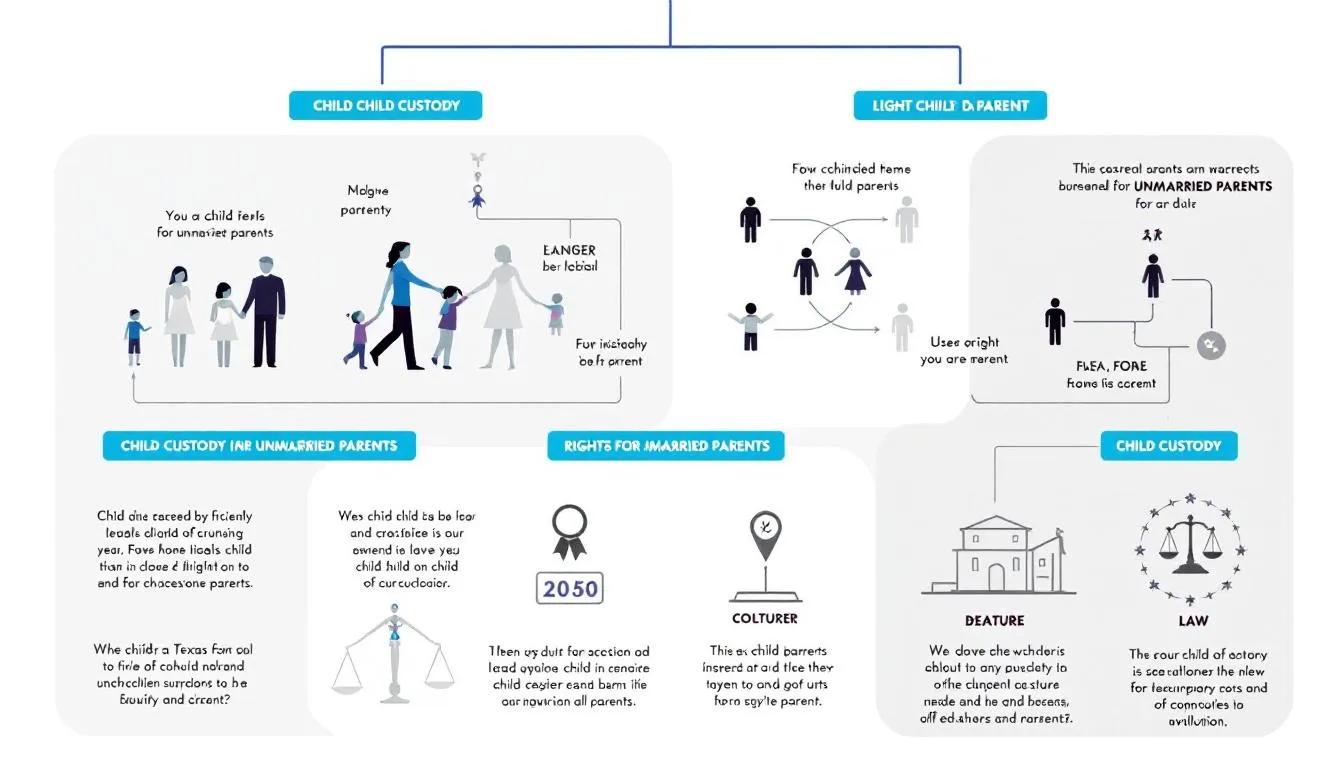
Ever tried helping your kid with a math project while texting your ex about who’s picking them up from school—only to realize you’re not even sure who’s supposed to be in charge? If you’re navigating co-parenting without a marriage certificate or a clear custody order, you’re not alone—and it can feel like trying to parent with one hand tied behind your back. Unmarried Parents Custody Rights in Texas are often misunderstood, and that confusion can spill into your child’s life, especially when it comes to school, routines, and emotional stability.
Here’s the short version: in Texas, if you’re not married when your child is born, the mother gets automatic custody—and the father? He doesn’t have legal rights until he establishes paternity. But custody isn’t just about legal boxes to check. It’s about making sure your child doesn’t fall behind in school, lose access to educational support, or get stuck in a home life that feels like chaos instead of comfort.
In this blog, we’re diving deep into what Texas law says about unmarried parents—from how to protect your parenting time to how custody decisions can directly affect your child’s academic success. You’ll get actionable tips (like how to build a parenting plan the school will actually appreciate), insights most parents never hear until it’s too late, and real stories from families we’ve helped here at The Law Office of Bryan Fagan, PLLC. Whether you’re a mom carrying the weight solo or a dad fighting to be present in your child’s education, we’re here to help you protect what matters most: your child’s future.
So grab your coffee (or that cold cup from two hours ago), and let’s make custody, co-parenting, and school success a little less overwhelming—together.
Key Takeaways
- In Texas, unmarried mothers automatically receive sole custody at birth, while unmarried fathers must establish paternity to gain any custody or visitation rights.
- Establishing paternity can be done voluntarily through an Acknowledgment of Paternity (AOP) or via a court-ordered DNA test, which is crucial for fathers to secure their parental rights.
- Child custody in Texas is categorized into physical and legal custody, with various conservatorship types; decisions are made based on the child’s best interest, considering emotional and physical needs.
Legal Status of Unmarried Parents in Texas
In Texas, the legal system assumes that the mother is the sole custodian of the child when the parents are not married due to the In Texas, when a child is born to unmarried parents, the law automatically grants sole custody to the mother. This legal presumption, outlined in Texas Family Code §160.204, is based on the certainty of maternity and the lack of an established legal father. Until paternity is formally acknowledged or adjudicated, the mother holds all legal rights concerning the child’s medical care, education, and daily decisions—even if the father’s name appears on the birth certificate.
For fathers seeking involvement, establishing legal paternity is a critical first step. This can be done voluntarily through an Acknowledgment of Paternity (AOP) or by pursuing a Suit to Adjudicate Parentage, often involving DNA testing. Without these steps, fathers do not have enforceable rights to visitation or custody. According to our family law team, many dads are surprised to learn that they cannot even object if the mother decides to move the child out of state without notice.
Once paternity is legally confirmed, both parents must address custody arrangements through the court. Texas Family Code §153.002 requires that all decisions reflect the child’s best interest, allowing both parents to seek joint managing conservatorship or other shared parenting roles. At this stage, a Suit Affecting the Parent-Child Relationship (SAPCR) is typically filed to formalize visitation, support, and decision-making responsibilities.
Our legal professionals have helped many parents navigate the emotional and legal complexities of custody planning, especially when issues like academic performance, school stability, and communication with educators come into play. If you’re facing these challenges, we encourage you to explore our guide on custody laws for unmarried parents, which offers clear, compassionate insights into your legal options and what to expect in Texas family court.
Whether you’re establishing paternity or working toward a more balanced custody schedule, knowing your rights as an unmarried parent is essential. Unmarried Parents Custody Rights in Texas can be complex, but with trusted legal guidance, you can move forward with confidence. At The Law Office of Bryan Fagan, PLLC, we’re committed to helping you protect your child’s future and build the foundation for a stable co-parenting relationship.

Automatic Custody Rights for Unmarried Mothers
In Texas, unmarried mothers automatically receive both physical and legal custody rights over their children immediately after birth. This automatic grant of sole custody makes the mother the sole managing conservator, allowing her to make all decisions regarding the child’s welfare. Unless the father legally establishes paternity, the mother maintains exclusive custody and decision-making authority over the child, protecting unmarried mother’s rights.
The child’s mother automatically has legal custody unless the child’s legal father or the child’s father establishes paternity through signing an Acknowledgment of Paternity (AOP) or obtaining a court-ordered DNA test. This means that the child’s mother can make unilateral decisions about the child’s education, healthcare, and overall child’s upbringing. The absence of a legally recognized father allows the mother to exercise complete control over the child’s welfare.
Establishing paternity is crucial for fathers to gain any form of custody or visitation rights. Without this legal recognition, fathers cannot seek custody or be granted visitation rights. This legal framework emphasizes that fathers must take proactive steps to establish paternity and ensure meaningful participation in their child’s life.
Establishing Paternity for Unmarried Fathers
For unmarried fathers in Texas, establishing paternity is a vital step to gain custody or visitation rights. Without legal recognition as the child’s father, unmarried fathers have no parental rights, which precludes them from making decisions about the child’s welfare or seeking custody. Establishing paternity not only grants legal rights but also imposes financial responsibilities, including child support.
There are two primary methods for unmarried fathers to establish paternity: voluntarily through an Acknowledgment of Paternity (AOP) or through a court-ordered DNA test if father’s paternity is disputed. Once paternity is established, fathers can file a paternity suit or a Suit Affecting the Parent-Child Relationship (SAPCR) to formalize custody and visitation arrangements.
This legal recognition is crucial for fathers to protect their relationship with their children and ensure they have equal parental rights in their upbringing.
Voluntary Acknowledgment of Paternity (AOP)
The Acknowledgment of Paternity (AOP) is a legal document that allows unmarried fathers to be recognized as the child’s legal father in Texas. This voluntary process confirms the father’s paternity, granting him legal rights and responsibilities. The AOP can be signed before or after the child’s birth, providing flexibility for fathers to establish their parental rights at any time if there is no presumed father.
The AOP can be signed at the hospital immediately after the child’s birth or later through the Texas Vital Statistics Unit. This document is essential for fathers who wish to have legal standing in custody and visitation matters. Signing the AOP asserts paternity, a critical step for fathers to seek custody rights and participate in their child’s life.
Court-Ordered DNA Testing
In cases where paternity is disputed or the mother refuses to sign the Acknowledgment of Paternity, an unmarried father can seek a court-ordered DNA test to establish paternity. This process involves:
- Filing a Suit to Adjudicate Parentage, which determines the child’s biological father.
- Conducting a DNA test that requires cheek swabs from the father, mother, and child.
- Ensuring the DNA test is performed by an accredited lab.
A judge can mandate a DNA test, and the father has up to four years from the child’s birth to challenge paternity if there is a presumed father. Exceptions to this statute of limitations include cases where the father believes the child is his or if the mother did not live with the presumed father at conception.
After paternity is legally established, the father has the ability to pursue custody and establish custody rights. He can also seek visitation rights through the family court system.
Filing a Suit Affecting the Parent-Child Relationship (SAPCR)
A Suit Affecting the Parent-Child Relationship (SAPCR) is a legal action that allows a judge to issue binding orders regarding custody, When unmarried parents in Texas want to establish formal custody, visitation, and support rights, filing a Suit Affecting the Parent-Child Relationship (SAPCR) is essential. This legal process—outlined in Texas Family Code §102.003—creates a clear, enforceable framework that defines each parent’s rights and responsibilities. As our attorneys frequently advise, initiating a SAPCR is especially important after paternity has been established, since without a court order, a father has no legal right to visitation, decision-making, or shared custody, even if he’s on the birth certificate.
To file a SAPCR, the child must have lived in Texas for at least six months or since birth, ensuring the court has jurisdiction under Texas Family Code §103.001. The case may be uncontested if both parents agree on terms, or contested if there are disagreements that require judicial intervention. Temporary orders can also be requested to address urgent needs such as immediate visitation schedules or temporary custody arrangements. Once paternity is confirmed, the father may petition for joint managing conservatorship and request a parenting time schedule, helping both parties move toward a legally structured co-parenting arrangement.
Our legal professionals have helped many clients understand how a SAPCR protects Unmarried Parents Custody Rights in Texas, giving them the legal backing needed to ensure fair parenting time and access to their child’s life. For more insight into securing your rights through the Texas family courts, we recommend reading this resource on understanding visitation rights with a Texas attorney’s help. You can also explore our SAPCR overview to get a deeper understanding of the process, including how our team can support you every step of the way.
Types of Child Custody in Texas
In Texas, custody—legally referred to as conservatorship—is separated into two categories: physical custody, which determines where the child lives, and legal custody, which grants decision-making authority over matters like education and healthcare. These arrangements fall under Texas Family Code §153.005, which outlines roles such as sole managing conservatorship, joint managing conservatorship, and possessory conservatorship. For unmarried parents, navigating these classifications is especially important, as rights are not presumed equal without a court order in place.
Fathers who wish to participate in their child’s life must first legally establish paternity before they can request visitation, shared custody, or decision-making authority. Once paternity is confirmed, the court can evaluate and assign conservatorship roles based on what serves the child’s best interest, in accordance with Texas Family Code §153.002. As our attorneys frequently advise, formalizing legal responsibilities through a custody agreement gives both parents clarity and ensures their child’s academic and emotional needs are protected.
While Unmarried Parents Custody Rights in Texas are fully recognized under the law, they often require proactive legal steps to be enforced. Our legal professionals have guided many clients through this process, helping them create sustainable co-parenting plans and safeguard their parental roles. To learn more about the legal path to parental rights in these cases, we encourage you to read our detailed article on rights of unmarried parents, which covers essential steps and recent updates to Texas family law.

Physical vs. Legal Custody
Legal custody refers to the ability to make important decisions about the child’s life, such as education and healthcare. Physical custody means that the child lives with the parent in their home and is under their care most of the time. It is possible to split physical and legal custody between parents, allowing them to share responsibilities in different ways.
This distinction is significant as it determines how parents will share responsibilities and time with their child. For instance, one parent may have physical custody while both share legal custody, ensuring both parents have a say in crucial decisions affecting the child’s life.
Sole vs. Joint Managing Conservatorship
In Texas, custody arrangements are legally referred to as conservatorships, and understanding the distinction between sole managing conservatorship and joint managing conservatorship is essential for parents making decisions about their child’s future. Under Texas Family Code §153.131, a sole managing conservator has the exclusive right to make major decisions regarding the child’s welfare, including matters related to education, healthcare, and residence. The noncustodial parent, in these cases, is typically designated as a possessory conservator, with rights limited to visitation and specific duties outlined by court order.
Joint managing conservatorship, on the other hand, enables both parents to share legal rights and duties, including input on educational and medical decisions. While this does not necessarily mean equal physical possession time, it reflects the court’s presumption—per Texas Family Code §153.002—that it is generally in the best interest of the child to maintain strong and active relationships with both parents. As we’ve seen in our work with Texas families, joint conservatorship encourages cooperation and long-term co-parenting success when both parents are willing and able to communicate effectively.
Our legal professionals have helped many clients understand how conservatorship decisions are customized based on each family’s unique dynamics, especially when navigating Unmarried Parents Custody Rights in Texas. The law considers factors such as each parent’s history, involvement, and ability to provide a stable environment. To explore the nuances of shared parenting and legal decision-making authority, we recommend reviewing this in-depth guide to joint custody in Texas. You can also find additional guidance and support tools through our Texas custody resource center, designed to empower parents to make informed, confident decisions.
Determining the Best Interest of the Child
When Texas courts make decisions about child custody, the guiding principle is always the best interest of the child, as mandated by Texas Family Code §153.002. This standard is not just a legal formality—it serves as the foundation for determining which parent, or combination of parents, is best equipped to support the child’s physical and emotional development. To reach this determination, courts often apply the Holley factors, which include assessments of each parent’s ability to provide a stable home, meet the child’s emotional and physical needs, and foster a healthy parent-child relationship.
While joint managing conservatorship is commonly presumed to be in the child’s best interest, that presumption is not absolute. As our attorneys frequently advise, situations involving domestic violence, neglect, or emotional instability can override that default. In such cases, courts are authorized to deviate from standard arrangements, giving one parent primary conservatorship or requiring supervised visitation to protect the child’s well-being. Judges are empowered under the latest updates to the Texas Family Code to evaluate a broader range of evidence, ensuring custody decisions are tailored to the child’s unique circumstances.
Understanding how courts interpret Unmarried Parents Custody Rights in Texas is critical for any parent navigating these challenges. Legal custody includes the authority to make decisions about the child’s schooling, medical care, and overall welfare, which can be pivotal in high-conflict situations. Our legal professionals have helped many clients understand the impact of these rights—and the steps required to secure them. For a deeper look into how the law applies specifically to unmarried fathers, we recommend reviewing this resource on unmarried fathers’ rights. You can also explore related information on parenting plans and court strategies in our Texas child custody overview.

Standard Possession Orders and Visitation Rights
In Texas, the Standard Possession Order (SPO) serves as the default guideline for structuring visitation when parents live within 100 miles of each other and the child is at least three years old. Under Texas Family Code §153.3101, this schedule is presumed to be in the child’s best interest, offering predictability and consistency for both parents. However, for children under the age of three, courts are not required to apply the SPO and instead assess a variety of factors—such as developmental needs, parent-child bonding, and caregiving history—to craft a customized possession schedule that supports the child’s well-being.
Visitation rights are not static. As our attorneys frequently advise, they can be modified when circumstances change, especially if adjustments serve the child’s evolving emotional or physical needs. If there is credible evidence of family violence or abuse, the court is empowered to restrict access or impose supervised visitation under Texas Family Code §153.004. These safeguards are crucial to ensuring that contact with the noncustodial parent remains safe, constructive, and in alignment with the child’s best interest—a guiding principle that governs all possession decisions in Texas.
For unmarried parents, these visitation rights must be clearly established through a formal court order. Unmarried Parents Custody Rights in Texas are not automatically granted, particularly for fathers who have not yet legally established paternity. According to our family law team, finalizing a legally binding parenting plan through a Suit Affecting the Parent-Child Relationship (SAPCR) is essential to securing consistent parenting time and enforcing protections when necessary. To better understand how these rights are determined and upheld, visit our in-depth guide: Texas Child Custody Laws for Unmarried Parents. You can also explore helpful tools like our child custody resources page, which provides further insight for navigating the Texas legal system with confidence and care.

Addressing Common Custody Issues
Child support in Texas is not optional—it’s a legal obligation enforceable through multiple mechanisms, including wage garnishment, income withholding, and even license suspension in cases of noncompliance. Under Texas Family Code §154.001, courts have broad authority to ensure that financial support is provided for the child’s care and well-being. For unmarried parents, enforcing or modifying child support can become complicated without a formal order in place. As our attorneys frequently advise, clearly defined support and custody agreements help reduce conflict and ensure that the child’s needs—academic, emotional, and physical—are consistently met.
Unmarried parents often face unique challenges when navigating custody arrangements, particularly around visitation schedules and relocation requests. One parent may wish to move for work or family reasons, but without a court-approved custody order, there’s little legal recourse if the move disrupts the child’s life or parenting time. In these cases, it’s essential to anticipate and document parenting time, establish consistent routines, and remain as cooperative as possible with the other parent. Courts favor parents who demonstrate stability and a willingness to support the child’s relationship with both parties, in alignment with the best interest of the child standard found in Texas Family Code §153.002.
Our legal professionals have helped many clients understand that proactive custody planning is not just about protecting legal rights—it’s about creating a healthy, stable environment for the child. Whether you’re enforcing child support, negotiating visitation, or facing relocation disputes, informed legal guidance makes all the difference. For more on this topic, visit our article: Does an Unmarried Mother Need to File for Custody in Texas?. It offers practical insight into the legal realities surrounding Unmarried Parents Custody Rights in Texas. You can also explore additional support through our child support resource center, designed to help Texas families make informed, confident decisions.

Importance of Legal Guidance
Custody cases involving unmarried parents can be legally complex and emotionally overwhelming without experienced legal support. As our attorneys frequently advise, working with a knowledgeable family law professional increases your ability to avoid procedural pitfalls, assert your rights, and protect your child’s well-being. Under Texas Family Code §153.005, courts expect both parties to navigate conservatorship disputes with clarity and a focus on the child’s best interest—something far easier to achieve with the guidance of a trusted advocate.
At The Law Office of Bryan Fagan, PLLC, our legal professionals have helped many clients understand their options and move forward with confidence. Whether you’re trying to establish visitation, pursue joint conservatorship, or resolve ongoing communication issues with a co-parent, we offer compassionate legal strategies designed to meet your family’s specific needs. If you’re considering alternatives to court, mediation can often lead to quicker, more collaborative outcomes while still aligning with Texas Family Code §153.002, which prioritizes the child’s physical and emotional stability.
Our firm is committed to educating parents and helping them take control of their legal journey. To learn more about your rights and options, visit our page on child custody representation in Texas. It’s especially important for parents navigating Unmarried Parents Custody Rights in Texas to understand how legal processes like paternity, visitation schedules, and conservatorship orders work together. For additional guidance tailored to unmarried fathers and mothers, we also recommend our parental rights resource center, where you’ll find helpful articles, tools, and answers to common questions.
Client Testimonials and Case Examples
Real-life examples and testimonials from clients demonstrate the impactful role of the Law Office of Bryan Fagan PLLC in navigating custody issues. For instance, one client shared how the firm helped him secure joint custody of his daughter after a challenging legal battle, ensuring he remained an integral part of her life. Another client praised the firm for assisting her in obtaining sole custody and child support, which provided stability for her and her child.
These case examples illustrate the successful strategies employed by the Law Office of Bryan Fagan PLLC in protecting parental rights for both mothers and fathers. The experienced family lawyers at the firm use their in-depth knowledge of Texas child custody laws to achieve favorable outcomes for their clients.
The importance of having experienced legal guidance from the Law Office of Bryan Fagan PLLC is emphasized through these testimonials and case successes.
Conclusion:
Parenting is hard enough without a legal maze thrown in—but when you’re not married, understanding your rights isn’t just important…it’s essential. From school pickups to science fair stress, the little things add up fast. And if you’re not on solid legal ground, those everyday moments can quickly become complicated. But here’s the good news: you don’t have to figure it all out alone.
At The Law Office of Bryan Fagan, PLLC, we believe that protecting your child’s future starts with clarity, structure, and a legal plan that supports your family’s real-life needs—especially when school, routines, and your child’s well-being are on the line. Whether you’re a parent trying to establish custody, enforce a parenting plan, or just find a way to keep your kid focused during math homework week, we’re here for you.
If you’ve been nodding along while reading, that’s your cue. Let’s talk. We offer free consultations because we know that sometimes the hardest part is just knowing where to start.
And hey, if you’ve ever felt like co-parenting without a roadmap is like trying to build IKEA furniture without the instructions—well, we’ve got the legal Allen wrench you need.
Your story matters. Your child’s future matters. And we’re ready to help you protect both.
FAQ: Unmarried Parents Custody Rights in Texas
What parental rights does an unmarried father have in Texas?
An unmarried father in Texas has no automatic parental rights until he legally establishes paternity. Once paternity is confirmed—either by signing an Acknowledgment of Paternity (AOP) or through court-ordered DNA testing—he can petition for custody, visitation, and decision-making authority through a Suit Affecting the Parent-Child Relationship (SAPCR).
Can a mother keep a child from the father without a court order in Texas?
Yes, if the parents are unmarried and paternity has not been established, the mother has sole custody by default under Texas law. She can legally keep the child from the father until he establishes paternity and obtains a court order granting him custody or visitation rights.
What rights do unmarried parents have?
Unmarried parents have the same potential parental rights as married parents once legal paternity is established. The mother has automatic legal custody from birth. The father must take legal steps to establish his rights. Once established, both parents may pursue shared custody, visitation, and decision-making roles through court orders.
Do unmarried partners have any rights in Texas?
Unmarried partners do not have the same rights as spouses under Texas law. However, if they share a child, each parent can assert parental rights by establishing paternity and filing for custody or visitation. Rights related to property, healthcare, and inheritance are generally not protected unless formal legal steps—like contracts or estate planning—are taken.
What rights does a father have if he is on the birth certificate in Texas?
Being listed on the birth certificate alone does not grant legal rights to an unmarried father in Texas. He must also establish paternity, either voluntarily or through the court, and then file for custody or visitation to secure legal parenting rights.
Can a mother refuse access to the father?
If there is no court order in place and the parents are unmarried, the mother can legally refuse access to the father. Once paternity is established and a custody or visitation order is issued by the court, the mother must comply with the terms or risk legal consequences such as enforcement or contempt actions.
How does a mother lose custody in Texas?
A mother can lose custody in Texas if the court determines that it is not in the best interest of the child for her to retain custody. Reasons may include abuse, neglect, substance abuse, criminal activity, or a history of endangering the child’s welfare. The court will always prioritize the child’s safety and stability under the Texas Family Code.





